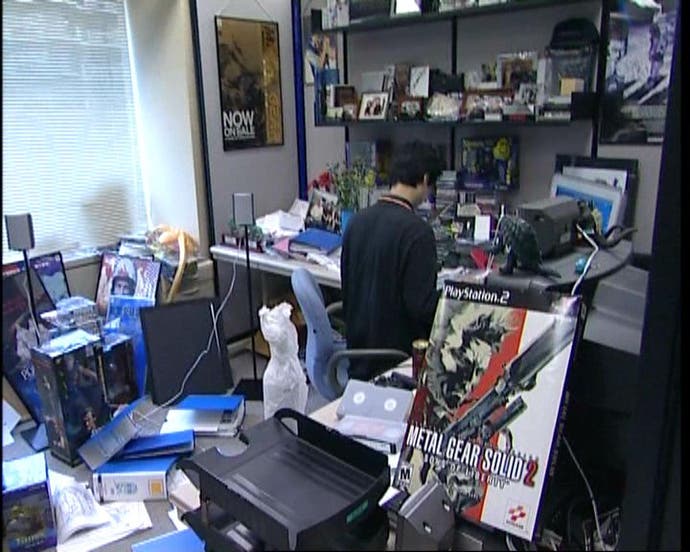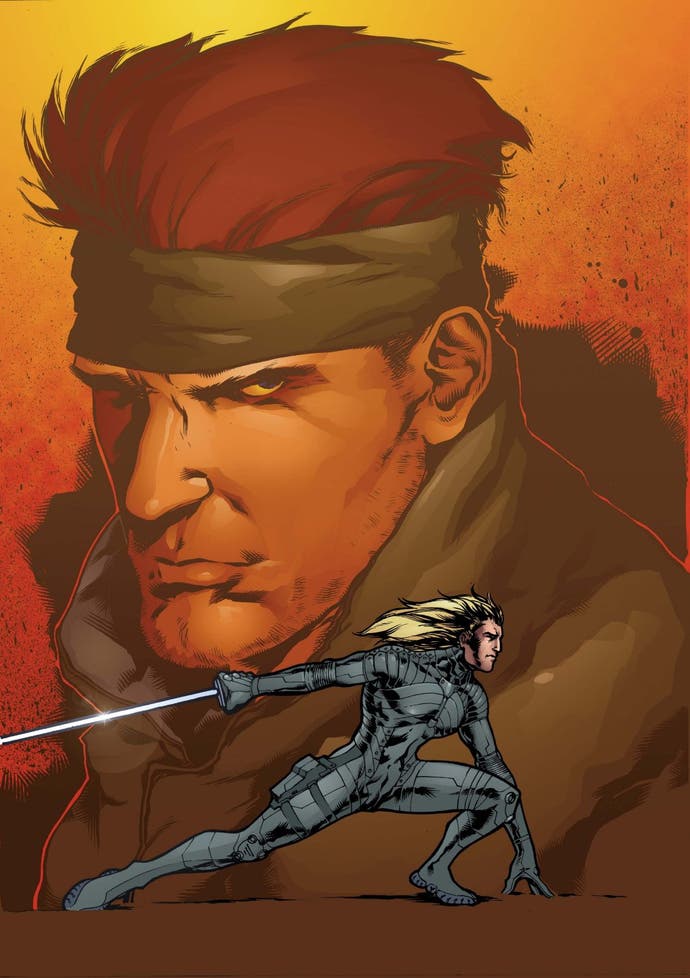Hideo Kojima and Harry Gregson-Williams
Interview - with Metal Gear Solid 2 a week away, we caught up with series creator Hideo Kojima and Harry Gregson-Williams, composer of the game's score
Next Friday marks the release of one of the most hotly anticipated videogames of 2002. It was amongst our picks for the year and has met with awesome critical acclaim all over the globe. I am talking of course about Metal Gear Solid 2 : Sons of Liberty, the culmination of three years' arduous work from Hideo Kojima's 70-strong development team at Konami Japan. MGS2 is already the fastest-selling PS2 game in the States to date, and the initial run of 500,000 copies for Europe is expected to sell out in short order. This Wednesday we caught up with the game's creator, Hideo Kojima, and the man responsible for the game's breathtaking score, Brit-in-exile Harry Gregson-Williams in an open Q&A session at London's Institute of Contemporary Art.

Future Echoes
Since the completion of MGS2, Kojima-san has been interviewed a number of times, and he felt it necessary to get one thing out of the way before we kicked off… "don't ask me what's next!" This didn't stop anybody though, and the very first question was whether or not Kojima-san planned to work on a movie next. "It's something I'm saving for sometime in my life. When the time comes and I've created enough videogames… maybe." How about the rumoured Wachowski brothers collaboration? "Yes, I've heard that rumour too." For someone not willing to talk about his next project, Kojima-san was surprisingly open in fact, admitting that "if people want to see MGS on other platforms, we might do it…" Shortly afterward, a chap in the front whose name we missed asked a tentative question about whether Kojima-san had considered extending MGS2's teachings to game design seminars and perhaps even apprenticeships at Konami. "I do not have any specific plans," he said, "but we are doing a 'Making Of' book - like a textbook - and if someone picks up the book and makes MGS3, I can always do something else!" Raiden, a character with whom players will become intimately familiar as they play the game, was the next subject. "I think Raiden is a little unpopular with players," his creator admitted, "but Raiden makes Snake stand out in MG2, and that was my aim. I still do not know about his future," he added, but refused to be drawn on the subject of his possible involvement in the announced Metal Gear Solid X. After watching the FUN TV-made documentary on the making of the game, which ships as a bonus DVD with the retail game next Friday, we had the chance to ask a few questions via translator. One of the first questions concerned the game's tardy European release date. "Localisation takes so long, and by way of an apology we have included the European bonuses," he told us. "The delayed release did give us the chance to brush up the game, though" he added.

Inspiring MGS
Europe clearly matters to Konami and the MGS franchise, and the company is anxious not to upset its loyal fans. "I think the Japanese market is special, different. In America and Europe, players want action, but in Japan, players are happy a passive role. Because you can take an active role MGS2, this makes it more popular in the West." The FUN TV documentary - a European exclusive, which Konami recommend gamers watch after completing the game due to the number of spoilers - gave us a unique insight into the game's development. Despite having pinned the inspiration for Metal Gear Solid on Space Invaders of all things in a British PlayStation 2 magazine, Kojima-san had an altogether different message for the makers of the documentary. "I still play hide and seek with my son. That's actually where I came up with the idea for MGS." In another odd revelation, Kojima-san explained that the inspiration for the game's main protagonists, Solid Snake and virgin blood Raiden, apparently came from two of the world's most iconic monsters: Godzilla and King Kong. But you'll have to watch the documentary for yourselves to learn how. Turning back to the game, journalists then took it in turn to grill Kojima-san on the way the game is presented. "There is too much of the passive, non-interactive elements in Metal Gear Solid 2," the game's creator explained, "but we did not want to leave out the storytelling." Responding to a comment on the use of the codec, he seemed slightly ruffled. "The codec isn't there to tell the story," he explained. "It's a guide, like an extension of the manual, there as a tool to guide the player."

A Fresh Perspective
At this point, Harry Gregson-Williams, who has scored films such as The Rock and Armageddon and worked with such luminaries as Hans Zimmer, was introduced. He is of course responsible for the game's impressive score. Harry's session turned out to be a lot more relaxed, but he was lucky to get any questions at all after he ripped the first hopeful apart with a couple of choice witticisms. His involvement was crucial to the game of course, and he tipped his hat to the its Sound Director during the documentary and the round of questions for managing to take his rough outlines and mould them into such an imaginative, dynamic audio experience. His involvement actually began as a lucky break for the MGS2 team. "I received a mysterious package from Japan containing a lot of my music from films like The Rock, Replacement Killers and Armageddon and a request: they wanted me to do something like this for their game. Well, flattery will always get you somewhere, and I was intrigued enough to accept," he said, quickly adding "I don't know whether I'll do any more or not, but yes, I've had offers." Asked whether he took the repetitive element of games into consideration, he seemed surprised. "No," he said bluntly. "If I had thought it through I would probably have said no!" But how does a Brit break into Hollywood so easily, and in the relatively short space of six years… "Short?" he exclaimed incredulously. Someone then asked the inevitable question, what is your favourite game? "The last videogame I actually played was most likely Pong," he said, glancing around nervously. "I did get to go right through MGS2 though, as a journalist from GameSpot, Gamespong or something offered to come over to Hollywood and actually play through it with me. It was the first time I had seen how my music had been adapted, and I was very pleased with it."

The New Hollywood
Creating a score for the game tickled Harry's fancy for a few reasons though, most notably that he simply hadn't done it this way before. "It was different… back to front." As we learnt from the documentary, with film scores the composer is always working with the pictures, but in this case, he had no visual aids. "I didn't even have my monitor on, I was just writing music to fit moods; tension, ambience, excitement…" "I was able to push the boat out musically." Did it afford more freedom? "Sure. Sometimes I'd go a bit to the left or a bit to the right and these guys [gestures to Hideo Kojima and Konami representatives] would correct me, but I didn't have to think in film terms. I hope it's not too synthetic. A little bit epic, hopefully." One of the themes of the presentation was the convergence of videogames and film. The question eventually levelled at Harry was, are games as good as films? He answered instantly. "Sure. This guy [grabs Hideo Kojima] is just as talented as anyone in Hollywood." But someone from the BBC then leapt on the opportunity to test him, asking whether he felt the events and sound effects of the game dwarfed his work and if that frustrated him at all. "[Laughs] When I was working on Armageddon, there was this one piece of music that [director] Jerry Bruckheimer made me do over and over, and after almost breaking down over its composition it was finally agreed upon. This was the sequence when all the rocks were pelting the city. Then when I saw the film, I couldn't even hear it! Music isn't always audible in some scenes, and I think this game was much more generous to the music than cinema." At this point the floor was opened up to questions for both chaps, but the first also went to Harry. Would he have had any fun with the abandoned flood sequence (seen in the E3 trailer but eventually axed) if it had been included? "Yes, but you probably wouldn't have been able to hear the music."
Making a Stand
With Kojima-san fielding questions again, the conversation turned to the intrusion of September 11th onto the project and its anti-terrorist theme. "Yes, when the incident happened we were very nervous as a team… as a company. But in the end, we made no changes. Violence is violence and should be shown correctly. In this way it delivers a message; that violence is wrong. When you shoot someone, there is blood and they may die, and you can see the consequences for yourself, but really, violence is only a small part of Metal Gear Solid 2." And will people get the game's message? "Well, we get a lot of email feedback, and amongst all the complaints about the story and the game's contents [grins], we haven't seen anything to indicate it was misinterpreted." Before we were all booted out, Kojima-san was asked one final question. What games do you like to play? "Super Mario Brothers, Xevious and [something] Murder Case, which was never released internationally. These three games brought me to the industry in the first place. I don't play many games now, but I do have time for Smash Brothers with my son." Metal Gear Solid 2 : Sons of Liberty is due out in Europe on Friday, March 8th.
-

